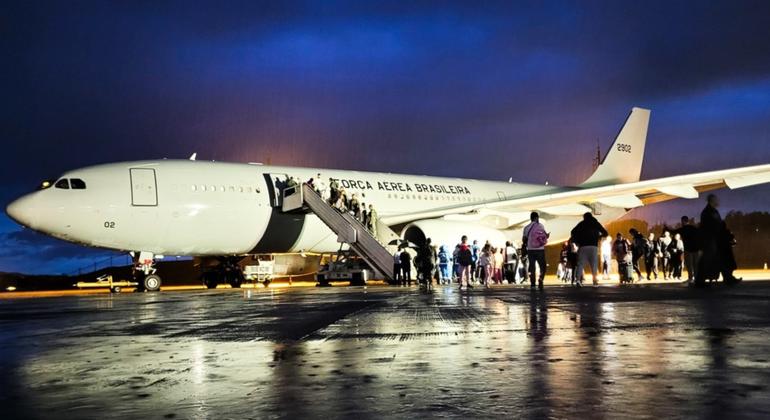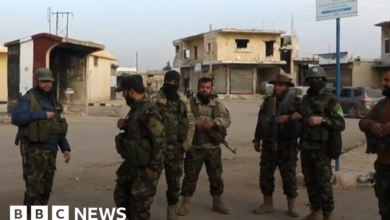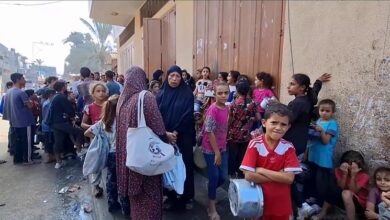Lebanon: Final repatriation flight brings Brazilians home amid ceasefire

The 13th and possibly final mission of Brazil’s Operation Cedar Roots brought 150 passengers, including the elderly and children, back to safety. For many, the relief of reaching Brazilian soil was tempered by the devastation they left behind.
“I am very happy, very grateful that this repatriation operation sent the plane to us,” said Mona Houssami, a Brazilian who has lived in Lebanon for 15 years.
However, her joy was overshadowed by the anguish of seeing her adopted home destroyed.
“It is difficult to see our country needlessly destroyed.”

Mona Houssami (second from right), who lived in Lebanon for 15 years, reunited with her family
Historical repatriation numbers
Brazil is home to the world’s largest Lebanese diaspora, with about 8 million citizens and descendants. This number is larger than the population of Lebanon itself, which has about 5.5 million people.
The flight marked the 13th and possibly final repatriation mission under the Brazilian government program, which began on October 5 and has brought home 2,663 people and 34 pets from Lebanon.
The operation took place amid a newly implemented ceasefire in Lebanon, prompting Brazilian authorities to assess security needs and conditions for a potential 14th flight. The Brazilian Embassy in Beirut remains in contact with citizens and their families to assist in securing flights, the Ministry of Foreign Affairs said.
The initiative has been hailed as a groundbreaking example of coordinated public policy.
“These are historic repatriation numbers that we are witnessing today at this final reception,” said Maria Beatriz Nogueira, head of the United Nations refugee agency. UNHCRoffice in São Paulo, is committed to supporting such humanitarian assistance programs.
Network of support and partnerships
Many stakeholders were involved in this exercise, including United Nations agencies, Brazilian ministries and civil society organizations.
International Organization for Migration (IOM) conducted interviews to assess protection needs, assist with documentation, and provide logistical support. UNHCR contributed translation services and facilitated family reunification.
Thaís Senra, project coordinator at IOM, emphasized the agency’s ongoing role in ensuring the smooth integration of returnees.
“We provide ongoing logistical support, including accommodation, travel arrangements and data management, ensuring a smooth onboarding process in the country and then facilitating favors measures of integration into Brazilian society.”
According to Cinthia Miranda, general emergency coordinator in Brazil’s Unified Social Assistance System, or SUAS, the comprehensive nature of the operation also reflects Brazil’s broader commitment to inclusion. and social protection.
“The Brazilian government has one of the most progressive laws in the world when it comes to welcoming migrants,” she said.
“We believe in fighting poverty and vulnerability, and we are proud to be a model nation for the world in ensuring rights. Through this activity, we wish to demonstrate Brazil’s humanitarian and welcoming spirit,” she added.

Brazilian Nura Yassine (second from right) lived in Lebanon for 16 years, reunited with family in Brazil
A Lebanon “without the sound of fighter jets”
The flight marked a turning point for individuals like Nura Yassine, a Brazilian who lived for 16 years in Lebanon. Reflecting on her experience, she describes war as a source of constant fear and suffering.
“The war created a lot of fear and negative thoughts,” she said. “I feel relieved to be in Brazil and hope to one day return to Lebanon without the sound of warplanes.”
As the largest repatriation initiative of Brazilians from a conflict zone, Operation Cedar Roots highlights the importance of international cooperation in resolving humanitarian crises.
Ms. Miranda emphasized that the initiative involves “many hands,” including many ministries, United Nations agencies and civil society organizations, and especially the Arab community -Lebanon overseas.




